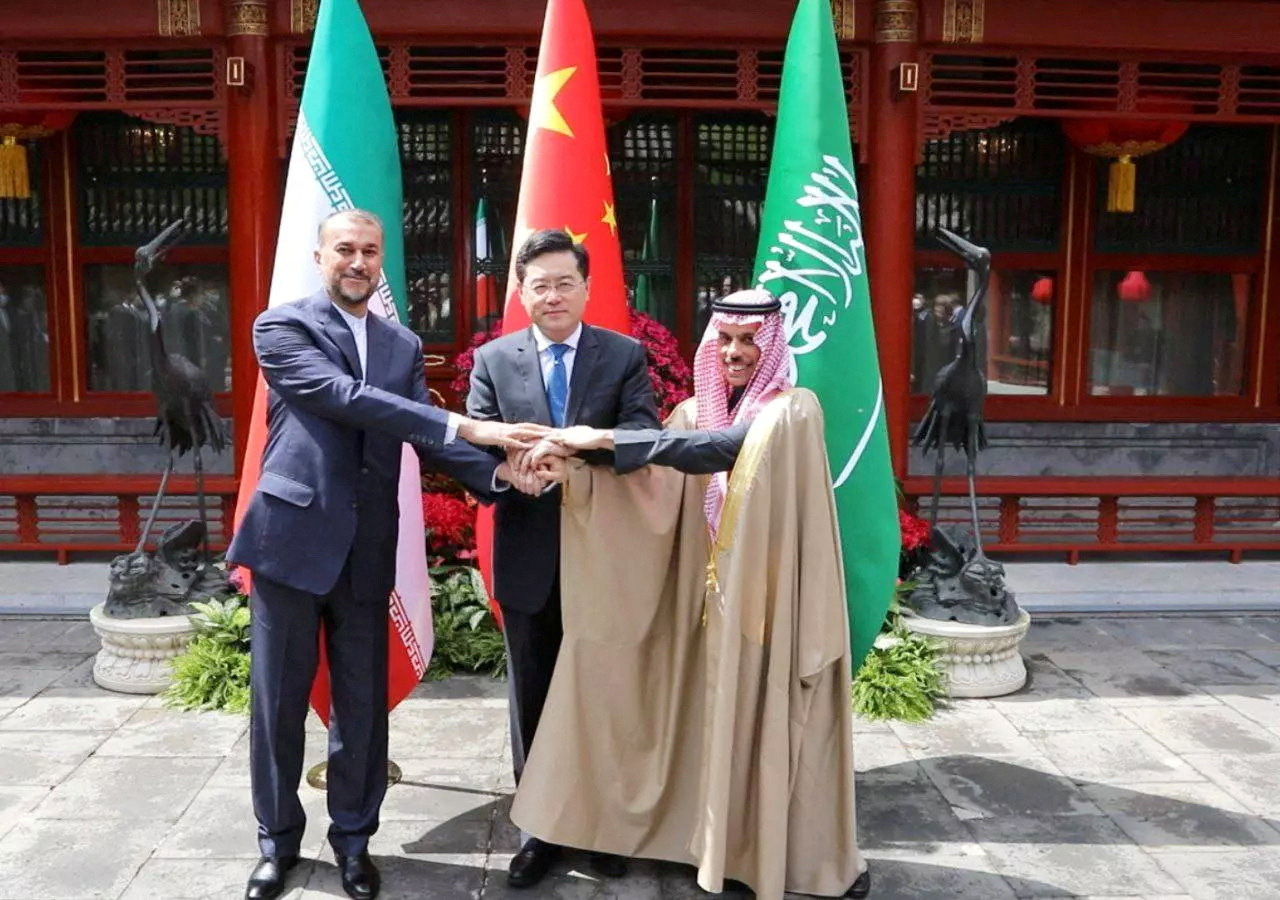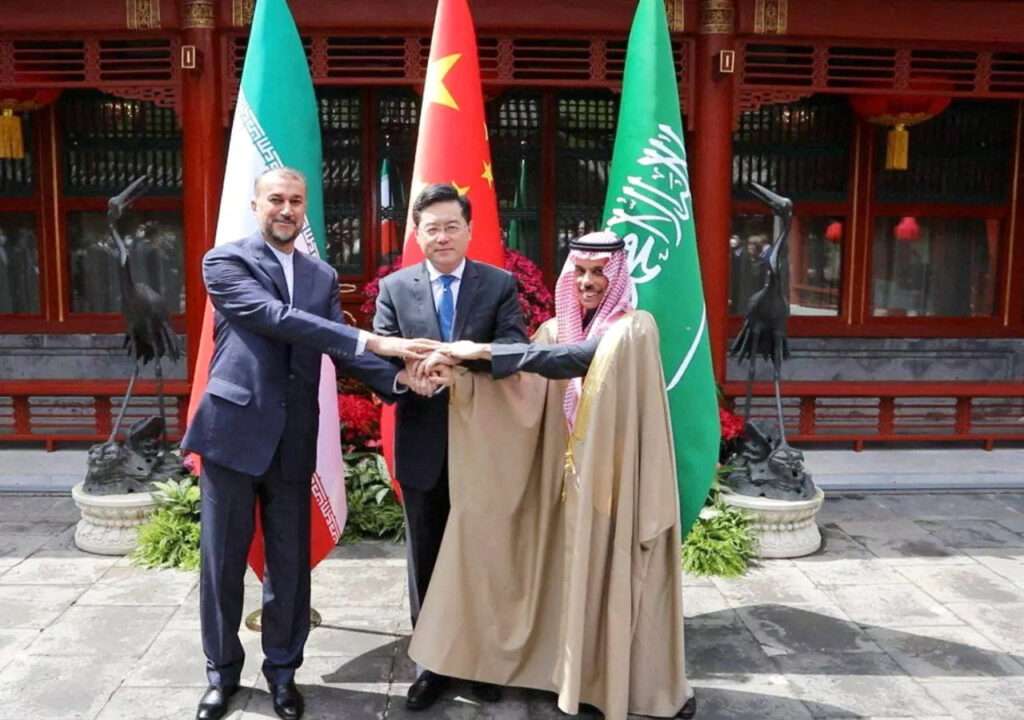
About the current situation in the Middle East
The past 6th April, the foreign ministers of Saudi Arabia and Iran met in Beijing, and agreed to reopen the embassies in both countries, deepening the reestablishment of their diplomatic relations. At the same time, the Israeli State bombed southern Lebanon, after receiving some rocket attacks against its own territory from the same area, accusing mainly Hamas of these attacks. It is believed that the attacks from Lebanon are being carried out by Hezbollah, an organization supported by Iran.
This is part of the general context of shifting balances of power in the Middle East, and the same is the case with Israel’s recent and repeated bombing of Syria, which we have reported on several occasions in this newspaper. Of particular relevance was the bombing of Aleppo airport, which was essential for humanitarian reasons after the earthquake. The State of Israel claims that they attacked the airport because it has logistical importance for Hezbollah.
In this context, on 10th March there were the agreements between Iran and Saudi Arabia, which took place in Beijing. After this meeting, both countries announced the re-establishment of diplomatic relations between them, after they had been severed since the beginning of 2016. This has been achieved with the mediation of Chinese social-imperialism, which, has major economic interests in the area. China’s important role was recognised by the Saudi foreign minister, who stated: ”China is our biggest trading partner (…) China for us is an important and valuable partner in many areas”. Organisations such as Hezbollah, as well as other countries in the region such as Iraq, Oman and the United Arab Emirates, welcome the agreement.
Following these initial talks, a number of agreements have been signed, such as the establishment of a joint Chamber of Commerce on 4th April, and at 6th April they agree on reopening the embassies and to establish trade relations between them. In addition to these agreements between Iran and Saudi Arabia, there are others, such as Iran sending official diplomatic representation to the United Arab Emirates after almost eight years without official representation there, with Iran aiming to further increase its ties with other states in the Arabian Peninsula.

The agreements between Iran and Saudi Arabia may affect many countries in the region, and in fact there are already regional reports of progress in negotiations in Yemen, as well as Iran agreeing to stop arming the Houthis. Other countries where there may be changes are in Lebanon, some media reports suggest that the most likely outcome is a reconciliation of different factions, which would result in a stable Lebanese State, and thus a place where the State of Israel could not enter as easily as it has been able to do in recent years. A similar case could be made for Iraq, which is under Iranian influence, but its new Prime Minister, Mohammed Shia al-Sudani, is reportedly also seeking relations with Saudi Arabia.
The case of Syria is particularly relevant for the USA and the State of Israel because of the importance of Bashar al-Assad as a strong connection of Iran and Russian imperialism, and because of the support given by Hezbollah and the use made of this organization on Syrian territory. In this case, the role of the Russian imperialism has been relevant because it has mediated between Turkey and Syria to stabilize the government of al-Assad, and according to Al-Monitor, has achieved that Turkey accepts to remove the majority of their troops from North Syria, showing that Russia is still an important actor in the region. In this case Iran also achieved some objectives, since there is an attempt to consolidate the Syrian State and normalise the situation in the country. The Turks’ interest lies partly in the possibility of coordinating with Assad to suppress the Kurdish nationalist movement. More importantly, according to Reuters, Saudi Arabia wants to invite the Syrian president to the summit of Arab leaders in May, something the newspaper says would ‘formally end Syria’s regional isolation’.
This is a victory for Chinese social-imperialism, which in recent years has increased its position of influence over Iran with collaboration in different areas: diplomatic cooperation on the nuclear race issue; joint military naval maneuvers together with Russia; and especially increasing oil imports from 2022 onwards. Chinese investments are of great importance for the whole region: China has made huge investments in terms of oil imports, construction of huge infrastructures linked to the Belt and Road Initiative (BRI) project, and increasing investments also in the reconstruction of Syria and Iraq. Regarding the economic relations with Saudi Arabia, they are particularly important in terms of trade in oil products, since China is the main importer of Saudi oil, and Saudi Arabia recently joined the Shanghai Cooperation Organisation, a security and economic forum that follows the designs of Chinese social-imperialism, as a partner.
According to the analysis of several international media, such as The Guardian, this diplomatic restoration would put China in a strong diplomatic position, not only with regard to the Middle East, but globally, as a possible ‘guarantor of peace’, including for the negotiations in Ukraine. Former US diplomats, such as Hillary Mann Leverett, claim that ‘people in Washington are surprised and concerned about the state of US power in the world’. The turkish newspaper Yeni Demokrasi states the following: ‘’Of course, it is possible to talk about the declining US hegemony. However, it would be an exaggeration to make the assumption that the power of the United States has come to an end through an agreement.’’.
This put US interests in danger in the region for several reasons: the concern that Chinese social-imperialism is entering with force on the international diplomatic arena, specially on that region; that China will dispute the economic dominance of US imperialism in the region, putting in danger many US interests in countries that have historically been US partners in the region, such as Saudi Arabia, which is being dragged towards Chinese influence.
All this affects the interests of US imperialism in another way, and that is by isolating the State of Israel, which has historically been a secure base for US imperialism, and by conforming a more stable region, and even, possible united fronts against the State of Israel. It would be dangerous for their interests if the al-Assad government is stabilised and internationally recognised, and a stable Lebanese State is also achieved. This could be added by Iran’s economic growth and a fall from grace of the Abraham Accords, if Iran, Saudi Arabia and the other Persian Gulf states finally enter into close cooperation, as Iran in particular wants to do. These agreements were particularly important for the State of Israel because they created an unprecedented agreement through which the Israelis normalised relations with numerous states, leaving a secure base for US imperialism in the region. In fact, in this regard, both Netanyahu and Israeli intellectuals linked to the State claimed that the fundamental thing about an agreement with Saudi Arabia was ”to make a bloc against Iran in the region”, so this diplomatic reestablishment ”would be very bad news for Israel”.
The agreements and the approach of countries like Saudi Arabia to China is linked to it’s foreign policy, because Chinese social-imperialism appears to be more peaceful. Regarding this, some experts talk about this: ‘’Beijing’s foreign policy of balancing between rivals and increasing multilateralism has enabled China to deepen its ties with the Middle East. While engaging with the region, China has focused on shared interests, which are largely economic, and has emphasized South-South cooperation. Beijing has maintained a position far from the immediate vulnerabilities of protracted conflicts, but now new challenges are expected as the security arrangement and balance of power in the region will likely change depending on several factors, especially the future of nuclear talks with Iran.’’ This is the way how China are approaching to the Middle East countries, after decades of continuous war with the Yankee military attacks on Iraq, Afghanistan or the instability of the Arab Spring, or it’s support to the actions of the State of Israel, that are becoming more aggressive. China promises stability and economical prosperity, while the US imperialism has shown the opposite through the years and wants to keep the region in a permanent state of war. It should be obvious that China’s promises of peace and stability, mean just a phase of preparation of new wars, following the logic of imperialism.
Shortly after the agreements of March between Iran and Saudi Arabia were announced, and at the same time of beginning of Ramadan, the Israelis have intensified their repressive campaign against the Palestinian people, especially in the last week, with the evictions and attacks on worshippers in the Al-Aqsa mosque. This is not only part of the local policy of the State of Israel and its repression on Palestine. Palestine is part of the battle being waged in the Middle East, with actors influenced by some countries, and with a state such as Israeli State acting as a guarantor of US interests in the region. During the month of March the Israeli State have bombed Syria, launched a campaign to weaken and severely repress the Palestinians, and are currently also bombing Lebanon, which could also be another country affected by a normalisation of relations between internal factions in dispute. The different actions taken against the Palestinian people by the Israeli State happened in parallel with the gradual conclusion of agreements between Iran and Saudi Arabia, and in turn, that first there are attacks and provocations, then the Palestinian people explode, and then they are used as a pretext to strike not only Palestinian territory such as Gaza, but also Syria and Lebanon. This is the historical policy that the US imperialism has been carrying out for decades in the Middle East.
Regarding this, we already wrote an article on 27th March mentioning the repression of the Palestinians, and we mentioned the following: ”At the beginning of the Muslim holy month, Ramadan, the Israeli occupiers continue their harassment and genocidal crimes against the Palestinians. Already at the beginning of the year, 84 have been killed, and the number is rising (…)”. The same can be said about the arrests. At the end of March, Israeli State troops fired on demonstrators near the Gaza border. Tension continued to escalate with the willingness of the State of Israel to set up new checkpoints for entry into Jerusalem, and there were murders of Palestinians in several cities. Finally, on 5 April, Israeli troops entered the Al-Aqsa Mosque with stun grenades and beat the worshippers. Twelve were injured and hundreds were arrested. According to the website ”Free Palestine” which echoes various media in the region, 400 people were arrested. Then, bomb attacks were carried out on the territory of Gaza, officially to hit Hamas targets.

All these actions by the Israeli State have been followed by rocket attacks from the Gaza Strip and southern Lebanon by Hamas and Hezbollah, and then the bombings by the Israeli armed forces. Moreover, there is no sign of de-escalation by the Israeli State at the moment; rather, the situation is worsening. For example, on the statement made on 7 April by Israeli Prime Minister Benjamin Netanyahu said the following regarding rocket attacks on Israeli territory: “Israel’s response, tonight and later, will come at a significant price for our enemies (…) The internal debate in Israel must not prevent us from taking action against them, wherever and whenever necessary. All of us, without exception, are united in this”.

